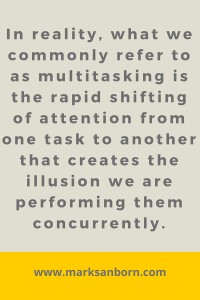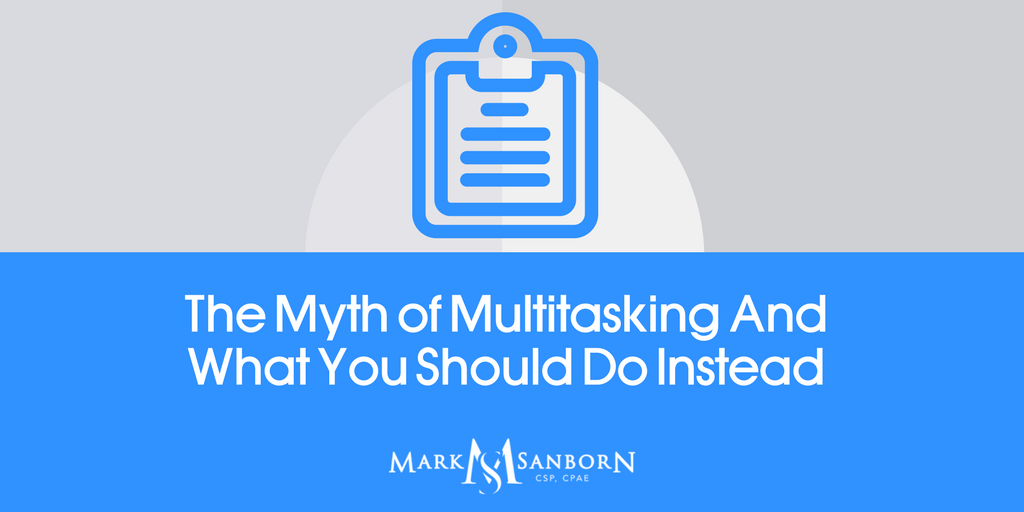 “My kids are natural multi-taskers!” a friend exclaimed. She bragged that they could listen to music, watch TV and do their homework all at the same time. She might have been proud of their efforts, but she wasn’t accurate about their abilities. Research has concluded that it will take her kids longer to do their homework and likely they won’t do it as well.
“My kids are natural multi-taskers!” a friend exclaimed. She bragged that they could listen to music, watch TV and do their homework all at the same time. She might have been proud of their efforts, but she wasn’t accurate about their abilities. Research has concluded that it will take her kids longer to do their homework and likely they won’t do it as well.
We think of multitasking as the ability to successfully perform more than one activity at the same time. It has become a seemingly ubiquitous phenomenon like walking in the park while talking to a friend. But there is a difference: walking doesn’t require our cognitive attention so we are free to concentrate on our conversation. Other situations are more complex. For instance, it is a different matter to read a book and listen to a lecture.
In reality, what we commonly refer to as multitasking is the rapid shifting of attention from one task to another that creates the illusion we are performing them concurrently.
Nancy K. Napier Ph.D., in her article, The Myth of Multitasking said, “…much recent neuroscience research tells us that the brain doesn’t do tasks simultaneously, as we thought (hoped) it might. In fact, we just switch tasks quickly. Each time we move from hearing music to writing a text or talking to someone, there is a stop/start process that goes on in the brain.” This rapid switching of tasks is tedious, makes us prone to error and loss of concentration and ends up consuming more time than if we undertook one task at a time.
And all the switching comes at a neurobiological cost. There is a structure in the brain responsible for switching tasks. Every time we change tasks, the brain responds by triggering a neurochemical switch which involves the consumption of glucose which is limited in supply. After a series of rapid switch activities, so much glucose is depleted and we tend to feel worn out. This depletes essential neural-resources, inhibits right thinking and leads to errors.
Another problem is attention residue. Sophie Leroy, a professor at the University of Minnesota, found that is it difficult for people to switch their full attention to a new task. There is carryover from the previous unfinished task that prevents giving the new work complete focus, and that explains the term attention residue.
Workplace demands often create the perceived need to continually switch tasks. That makes people less efficient and effective. When we suspend one task to undertake another we end up carrying baggage from our previous work into our next undertaking and the desired results are diminished. In short, it would be more productive, more fulfilling and less time consuming to concentrate on one task and, if possible, to complete it before undertaking a new one.
The ability to do a thing well and quickly requires full attention, and the myth of multi-tasking prevents that from occurring. We fool ourselves by mistaking increased activity with improved results, and create negative side effects of which we are often unaware. Success in any area is a function of the capacity to pay attention. Isaac Newton, for example, credited his much success and discoveries as “owing more to patient attention than to any other talent.”
So what can you do? Here are some suggestions:
- Stop fooling yourself. You’re not truly multi-tasking, you’re task switching. And that’s fine if that’s what you want to do. But there is a better way.
- Start each day by identifying the most important work, tasks and projects that you need to accomplish. Schedule a specific time to work on them rather than attempting them between other tasks.
- Block uninterrupted time to work on important projects. Aim for at least 30-60 minutes without phone calls, walk-ins or other distractions.
- Turn off your email when having an important conversation.
- Choose to focus your attention on one thing at a time. For example, at your next meeting, try listening to others rather than glancing at your smart phone or jotting unrelated notes.
- Give people your undivided attention. While it sounds cliche, it is difficult to do but the payoffs are big. Not only will you improve the interaction, but you’ll demonstrate the regard you have for the other person.
- Consciously avoid demanding others to multi-task. Don’t interrupt a colleague involved in another activity to make a request. Pick (or schedule) times to interact when the other person isn’t distracted by competing demands.
- Read Cal Newport’s new book, Deep Work. It is one of the best books I’ve read in recent years and will provide many insights and tactics you can use to beat the myth of multitasking.
Learn more about the power of focus in my series on the Principles of Leadership









